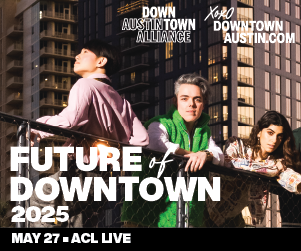About the Author
Elizabeth Pagano is the editor of the Austin Monitor.
Newsletter Signup
The Austin Monitor thanks its sponsors. Become one.
Most Popular Stories
- Facing overwhelmingly negative feedback, city drafts refinements to residential permit parking program
- Two Years after the Austin Police Oversight Act passed, Community Police Review Commission finally meets
- New Data Center Planned for Lockhart in 2028
- Changes on the way for Austin’s scooters
- City eyes expanded district plan for downtown and beyond
-
Discover News By District
Council OKs effort to seek state funds for new events at racetrack
Friday, December 14, 2012 by Elizabeth Pagano
Austin City Council yesterday struck another deal with the recently annexed Circuit of the Americas racetrack, voting 5-2 to approve a resolution that would allow the venue to benefit from the state’s Major Events Trust Fund for hosting additional activities other than the Formula 1 U.S. Grand Prix.
City Council approved a measure that would allow the Circuit Events Local Organizing Committee (CELOC) to act on the city’s behalf to submit future requests to the state for support from the fund. It’s similar to the deal that was struck for Formula 1, which will leave the city out of the business of contributing money, then receiving that money back from tax revenues. CELOC will assume that role instead, acting as a proxy for the city.
This time, the agreement will be for smaller events such as the World Endurance Championship, the American Le Mans Series and the MotoGP motorcycle race, which is scheduled for April.
Council Members Laura Morrison and Kathie Tovo voted against the resolution.
The Circuit of Americas Organizing group recently received more than $29 million from the state fund for the U.S. Grand Prix, which drew more than 117,000 people during its inaugural race-day weekend last month. The projections for revenues from the upcoming events were much smaller. It would be “in the neighborhood of $2 or $3 million,” Ambrust and Brown attorney Richard Suttle told City Council.
Council Member Bill Spelman said, “If I were, through some awful chance, elected to the state Legislature, and I heard the sequence of events and facts before us here, I would be shocked and appalled, and I would be asking for investigations, and I would be leading the charge to stop this travesty and eliminate the Major Events Trust Fund from the budget. …I don’t think the state is getting a bargain on this. On the other hand, I’m not a state legislator, and I’m not here to argue on behalf of all taxpayers in the state of Texas. I’m here to argue on behalf of taxpayers and residents of the city of Austin. From the city of Austin’s point of view, this is a very good deal.”
“The city of Austin is better off because F1 was in it than it would have been with F1 not in it,” said Spelman. “I’m more than happy for these events to take place in Austin, Texas. I’m more than happy for F1 to continue to take place for the next 10 years – particularly if the citizens of Austin, Texas do not have to pay for it.”
Morrison did not share Spelman’s pragmatism – or his optimism. She noted that analysis of the economic impact of the inaugural Formula 1 race was not yet complete. “I’m not sure Austin and our pocketbooks were better off because of F1,” said Morrison. “We expended huge resources, and I have no idea if the order of magnitude compares, and how it would compare, with the tax revenue we got from F1.”
Morrison reminded those present that the increased revenue generated from the city’s hotel tax and sales tax may not have been large enough to pay for police and other city resources that were expended.
Morrison also cited the benefit afforded City Council by the extensive citizen scrutiny that took place when City Council endorsed Formula 1 participation in the fund.
Susan Moffat, who opposes tapping the state events fund, complained that the late posting of the item on the City Council agenda precluded such heavy participation this time.
Suttle explained that recent annexation by the city, an upcoming break for City Council and deadlines from the state conspired to rush the process. He explained that by the next Council meeting, it would be too late for MotoGP to participate in the state’s Major Events Trust Fund.
“Without some sort of public assistance, these events don’t work,” said Suttle.
According to the state Comptroller of Public Accounts, Texas’ event trust funds are designed to help communities offset the costs of hosting sporting and non-athletic events. To qualify, an event must be competitively bid, draw out-of-state visitors (since the money they spend increases the tax revenues for state and local governments) and the community must be competing with cities outside of Texas for the right to host the event. A local government seeking event trust funds must bear some of the cost of hosting the event.
Tovo said that she doubted support from the city of Austin was necessary for events at Circuit of the Americas to continue, noting that tickets for several of the events that may benefit from the fund were already on sale.
“Those events will go on, regardless of our decision here today,” said Tovo. “I do not think the city of Austin should engage in being a conduit … to allow recreational events to receive these public funds when we have such a desperate need for those dollars to be spent in education and a variety of other programs.”
You're a community leader
And we’re honored you look to us for serious, in-depth news. You know a strong community needs local and dedicated watchdog reporting. We’re here for you and that won’t change. Now will you take the powerful next step and support our nonprofit news organization?




